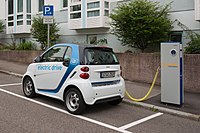As of January 2021 [update], there were about 6,300 electric vehicles (including plug-in hybrid vehicles) in South Carolina. [1]
Government policy
As of 2022 [update], the state government does not offer any tax incentives for electric vehicle purchases. [2]
As of 2021 [update], the state government charges a $120 biennial registration fee for fully electric vehicles, and a $60 fee for plug-in hybrid vehicles. [3]
Charging stations
As of 2021 [update], there were 384 public charging stations in South Carolina. [4]
The Infrastructure Investment and Jobs Act, signed into law in November 2021, allocates US$70 million to charging stations in South Carolina. [5]
By region
Charleston
As of August 2022 [update], there were 8 public charging stations in Charleston. [6]
Columbia
In 2022, Richland County School District One purchased the first electric school bus in South Carolina. [7]
References
- ^ Giroux, Zach (June 9, 2021). "Plugging In: Electric Vehicles In SC Have Evolved From Eccentric To Essential". The Daniel Island News. Retrieved May 2, 2022.
- ^ Fulton, R.E. (April 27, 2022). "South Carolina Electric Vehicle Incentives". getjerry.com. Retrieved May 25, 2022.
- ^ Adcox, Seanna (June 8, 2021). "SC electric vehicle drivers may see fee hikes to make up revenue shortfall for roadwork". The Post and Courier. Retrieved April 29, 2022.
- ^ "See how many electric vehicles are registered in South Carolina". WSPA. May 30, 2022. Retrieved August 31, 2022.
- ^ "South Carolina could get nearly $70M for electric vehicle chargers by 2026". WBTW. February 11, 2022. Retrieved May 27, 2022.
- ^ Llerena, Rey (August 30, 2022). "Charleston looking to upgrade its electric vehicle charging infrastructure". WCSC. Retrieved September 14, 2022.
- ^ Cooper, Amanda (October 27, 2022). "Richland One awarded over $6.3 million for more electric buses". Cola Daily. Retrieved December 20, 2022.

